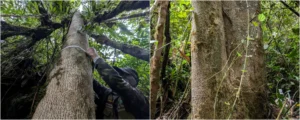

The fallen Magnolia coronata in the Arrierito Antioqueño Reserve — a symbol of life and memory in the forests of Anorí.
The forest ranger Alexander Arango reported the fall of the tree. According to his account, the heavy rains of recent weeks, combined with the natural aging of this giant, likely contributed to its collapse. Though the loss of such a specimen brings sadness, its legacy lives on in the ecosystem it helped sustain for decades.

The roots of the forest elder: silent witnesses to decades of life and balance.
This Magnolia coronata is an endemic species, listed as Critically Endangered (CR) by the IUCN (2025). It grows in the Andean forests of the Antioquia department, between 1,800 and 2,500 meters above sea level. Its flowers and seeds play a vital role in pollination and seed dispersal, while providing shelter and food to birds, insects, and other forest dwellers.

The flowers and seeds of Magnolia coronata are essential for pollination and the spread of life across the Andean forests.
This “Crowned Almanegra” was a monumental tree, rising above the forest canopy. It measured approximately 32 meters in height and 50 centimeters in diameter at chest level, growing beside a natural spring within the humid forest of the Reserve.
The ranger noted in his field notebook:
“…the Antioquia Brush-Finch (Lipaugus weberi) came to feed on one of its fruits,”
illustrating how this tree was an active part of the local landscape and its web of life.
As Ana María Rueda, coordinator of the Magnolia Project at ProAves, explains:

“Although the fall of this elder moves us deeply, it also opens the way for life: the light now reaching the understory will allow young Magnolia coronata saplings and other native species to grow — reminding us that in the forest, nothing is lost, everything transforms.”
This event is not just the farewell to a single tree, but a reaffirmation of the importance of conserving and restoring Andean forests — home to unique and threatened species.
According to specialist Dr. Marcela Serna (IUCN, 2025),
“The population of Magnolia coronata has declined by more than 80% due to habitat fragmentation. Remaining subpopulations are small and isolated, composed mainly of mature individuals.”
At the Arrierito Antioqueño ProAves Reserve, monitoring and reforestation efforts will continue, honoring the memory of this forest elder by protecting the new generations of magnolias sprouting beneath its fallen canopy.

New magnolia seedlings emerge where the elder once stood — life always finds its way.
The images captured from the site show the magnitude of the fallen tree and the life that still thrives around it — a reminder that nature always finds ways to renew itself.

